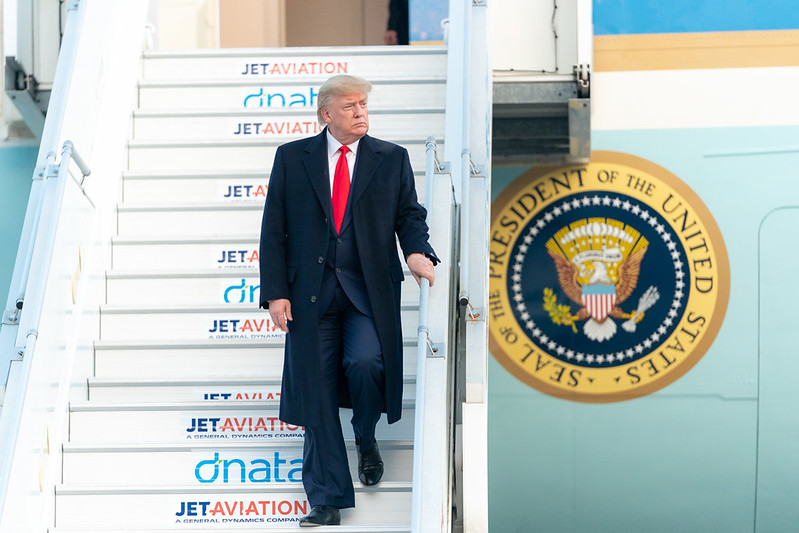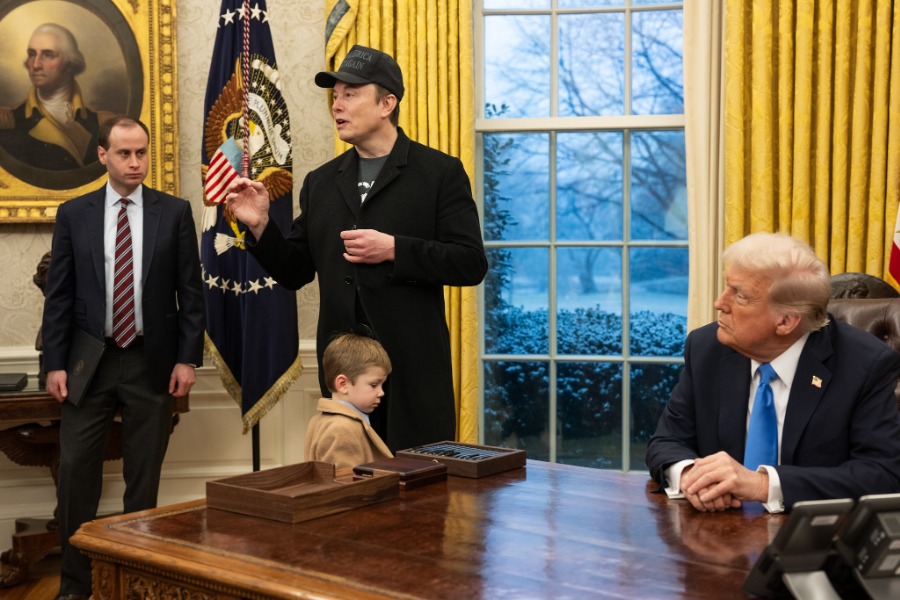The President’s Legal Shell Game to Avoid Accountability
President Trump and his lawyers are engaged in an attempt to fatally weaken the American system of checks and balances.

Published by The Lawfare Institute
in Cooperation With

It is a fundamental principle in our country that nobody is above the law, not even the president. This is not a new idea—it comes from the founding generation, which fought a war to escape from a king who legally “could do no wrong” and then tried to build “a government of laws, and not of men.” It is well documented that President Trump and his lawyers are engaged in a sustained assault on this principle. Again and again—in courts, in Congress and in public—they have argued that the president cannot be held accountable. And although the Supreme Court has postponed oral argument in several relevant cases because of COVID-19, we shouldn’t lose track of how dangerous the president’s arguments are and how high the stakes could be for our democracy. (Our organization, Protect Democracy, has attempted to create a comprehensive catalogue of these arguments, which is available on our website and will be updated periodically. Please let us know if there are items we are missing.)
Each of the president’s arguments, standing alone, might seem narrow or technical—aggressive to be sure, but not too far beyond what past presidents have argued. But when one takes stock of the full picture, what emerges is an alarming portrait of a president who believes that he is accountable to nothing and no one: not state or federal courts, not state or federal law enforcement, not Congress. Furthermore, there is an aspect of the president’s attempts to escape accountability that is (by design) less well understood and even more disturbing. President Trump and his lawyers are engaged in a legal shell game, as three former high-ranking Republican officials recently described it—namely, an attempt to obfuscate the true nature of their belief that the president is untouchable.
Here is how it works in its most basic form: President Trump resists accountability in a particular forum by suggesting that he can be held accountable only by some other entity. But then when that other entity seeks to check the president, he argues that forum too is an inappropriate place to seek accountability and that he should be checked in yet some other forum. And so on and so forth. The result? An endless circle of nonaccountability for the president and a fatal weakening of the system of checks and balances that are supposed to guarantee individual liberty.
An example of this shell game is playing out in the Supreme Court. The court was scheduled to hear oral argument on March 31—now postponed to a later date—in three cases in which the president is claiming to be above accountability, including Trump v. Vance. Vance concerns whether a New York grand jury can issue a subpoena to Mazars USA (Trump’s accounting firm) that would require Mazars to turn over Trump’s financial records as part of an investigation into possible violations of New York criminal law by several organizations and individuals. The U.S. Court of Appeals for the Second Circuit found the subpoena to be likely valid and therefore refused to block Manhattan District Attorney Cyrus Vance from enforcing it. Trump is now asking the Supreme Court to overrule the Second Circuit and block the subpoena. (The other two cases before the Court, Trump v. Mazars and Trump v. Deutsche Bank, also concern Trump’s financial records—specifically, whether they can be subpoenaed by Congress.)
President Trump’s arguments in Vance rely on a breathtakingly broad view of presidential power and prerogatives. Under the Justice Department’s traditional (but not universally accepted) view, the president cannot be indicted but a grand jury can “continue to gather evidence” of presidential lawbreaking while the president is in office. But in Vance, Trump is going further and arguing that he has complete immunity from all criminal process—and that such immunity extends even to subpoenas directed at third parties—because the president supposedly “cannot effectively discharge [his] duties if any and every prosecutor in this country may target him with criminal process.” His argument extends not only to potential criminal activity by the president but also to any criminal process that even touches on the president’s affairs, including, as in Vance, an investigation of other individuals and entities that are in some way affiliated with the president.
If Trump’s argument is adopted, he and future presidents will be completely immune from all law enforcement investigations that they do not choose to cooperate with. Impeachment would be the main remaining check on presidential lawbreaking. (In fact, that is precisely what Trump’s lawyers have argued in Vance).
Now, President Trump’s legal argument is wrong. There’s a long history of presidential subpoenas dating back to the earliest days of the United States ( indeed, even handwritten presidential answers in at least one instance). And the fact that the subpoena is coming from a local prosecutor rather than a federal official isn’t a problem either. The Supremacy Clause of the U.S. Constitution makes only the “Constitution, and the Laws of the United States ... the supreme Law of the Land.” It says nothing about the supremacy of federal officials. So, for example, federal officials must pay state sales and income taxes, follow local laws prohibiting shoplifting and burglary when they’re off duty, and provide evidence in criminal proceedings if subpoenaed, just like everybody else. The same standard applies to the president. Again, in the United States, nobody is above the law simply because he or she holds a government office—even the highest office in the land.
But focusing on the particular errors in Trump’s Vance arguments and getting into a debate about the nuances and scope of presidential immunity misses the most dangerous aspect of the president’s Vance arguments: They’re not being made in good faith. That’s where the shell game comes in. In Vance, Trump’s lawyers seem to realize that the Supreme Court might be uncomfortable adopting a rule that completely immunized the president from accountability even when he has broken criminal laws. So they told the Court that there is a way to hold the president accountable: impeachment. According to this argument, Congress’s impeachment powers are essentially the sole check on presidential lawbreaking.
But we know what happened when Congress tried to exercise its impeachment power to check potential presidential lawbreaking. Trump took the position that those proceedings were not legitimate either and did all he could to undermine them. In doing so, he broke a long-standing tradition dating back to George Washington that recognizes that the House of Representatives has the right to demand information from the executive to support impeachment proceedings—a right so self-evident that John Quincy Adams declared that it would make a “mockery” of the Constitution to think otherwise.
Trump’s position, in turn, forced the House back to the courts to attempt to enforce the subpoenas it had issued to obtain facts necessary to determine whether he committed an impeachable offense. Once in court, government attorneys have argued (to this point, successfully, although that may soon change) that the federal courts have no jurisdiction to resolve such an interbranch dispute. According to this argument, if the House believes that the president is unlawfully obstructing Congress, the proper remedy is impeachment.
That forced the House back to pursuing impeachment, but this time for obstruction of Congress. But when the House ultimately pursued that route, the president argued that he can’t be impeached for obstruction of Congress. Instead, he suggested that he can only be impeached for committing a crime or engaging in crime-like behavior.
Even then there’s a catch: President Trump believes that he can’t commit a crime when exercising his official powers because his Article II law enforcement powers give him the “the right to do whatever I want as president.” That includes both the power to formally obstruct law enforcement investigations by shutting them down as well as the power to more subtly obstruct justice by dangling pardons as well as intervening in his allies’ sentencing recommendations. Indeed, Trump’s lawyers have even said that his constitutional powers allow him to violate federal law whenever he is not motivated solely by private financial gain. Under that extreme view, it would be lawful for Trump to take a bribe in exchange for an official presidential action so long as one of his motives for accepting the bribe was to aid the public. And then, for the pièce de résistance, Trump’s lawyers define aiding the public so broadly—including, for example, actions motivated by a desire to aid his reelection campaign so long as he believes his election would be good for the United States—that it would be practically impossible for any president to ever break the law.
To summarize: President Trump’s view—advanced by his personal and executive branch attorneys—is that the president cannot be subject to even the most indirect criminal investigation, because impeachment is the only remedy for presidential misconduct. But the House cannot demand any information from the president in support of an impeachment investigation. And federal courts cannot enforce House subpoenas against a stonewalling executive branch, because the remedy for such stonewalling is impeachment. But the president cannot be impeached for obstruction of Congress, because that doesn’t rise to the level of criminal activity. And, the president, because he is president, is incapable of committing a crime. And in any event, federal and state law enforcement can’t investigate whether he did.
If Trump is allowed to continue with his shell game, where does that leave us? In short, we will see the near-complete evisceration of any checks and balances on presidential lawbreaking and we will slide ever-faster into autocracy. Impeachment would be left as the sole check on presidential lawbreaking, but it would ultimately be a hollow one because of Congress’s inability to investigate whether the president has committed an impeachable offense as well as the seeming legal near impossibility of the president ever committing an impeachable offense. In such a world, the only remaining check on presidential power will be an election—but even that will come into question, as nothing would stop the president from abusing his powers and breaking the law in order to gain an electoral advantage.
Our best hope to avoid this scenario is for courts—beginning with the Supreme Court in Vance and its sister cases—to recognize the bigger picture and reject President Trump’s extreme and unprecedented attempts to place the presidency outside the law. No matter where you stand on the political spectrum, it should be apparent that a president who cannot be held accountable by anyone is dangerously close to a king.
Disclosure: The authors work for Protect Democracy, which has represented Lawfare editors Benjamin Wittes, Jack Goldsmith, Scott Anderson and Susan Hennessey on a number of separate matters.







